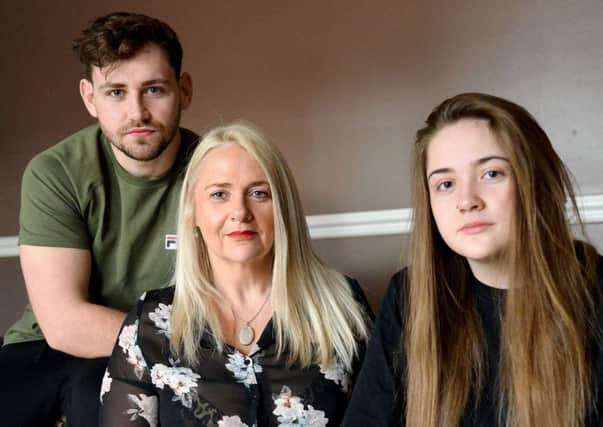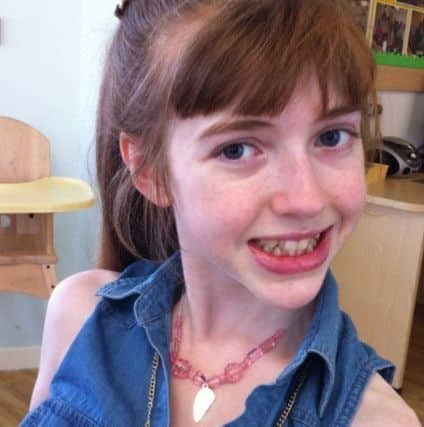Disease drug breakthrough offers hope to Hartlepool family


But a major drugs breakthrough for Huntington’s Disease is offering new hope to them and thousands of others.
In 2014 the inherited brain disorder claimed the life of their sister Ellie-Mae Morgan at the age of just 16.


Advertisement
Hide AdAdvertisement
Hide AdThere is a 50-50 chance that Harry-Jon, 22, and 18-year-old Livvy will develop the condition.
Now a “ground-breaking” drug trial has been shown to lower levels of the harmful protein responsible for the devastating disorder in people with Huntington’s.
Harry-Jon and Livvy now say they will take the test early in the New Year.
Harry-Jon, who is studying sports coaching at Leeds Beckett University, said: “Before, always the biggest struggle for me to get tested was if it was positive I was a bit lost on the future.


Advertisement
Hide AdAdvertisement
Hide Ad“This has been a big eye opener for me. I was always very optimistic but now I’m even more so.
“It is by no means a cure but it is something that can definitely contribute to someone with Huntington’s disease having a longer more healthy life.
“If I have the disease I will definitely put myself forward for trials of the drug.
“It is still at human trial stage but has had really positive results.
Advertisement
Hide AdAdvertisement
Hide Ad“It gives me the chance to do everything I ever wanted to do.”
Livvy, also a student based in Leeds, added: “I never really wanted to do the test, but I think now this is happening I will.
“I spoke to my family about getting it done in the New Year.”
Livvy and Harry-Jon’s mum Sam Carter, 50, described the breakthrough as wonderful, not just for her family, but for many affected by Huntington’s.
Advertisement
Hide AdAdvertisement
Hide AdSam said: “I actually sat and cried when I saw it on the news about the drug because I could see a future for my kids whereas before I didn’t want them to get tested because we didn’t want that positive result.
“It has just given us hope. It is not a cure but what it could do is slow it down so rapidly that they could lead a relatively normal healthy life for as long as possible.”
Sadly, the breakthrough is too late for Ellie-Mae, who was diagnosed with Juvenile Huntington’s Disease in 2012.
Over time she gradually lost her mobility and speech and her death has left a huge hole in her family.
Advertisement
Hide AdAdvertisement
Hide AdSam added: “I have friends with children who are too far along with Juvenile Huntington’s Disease but it is hope for thousands our children.
“We haven’t got a cure, we have got a potential treatment and we do have hope and that’s just fabulous for everybody in the Huntington’s Disease community.
“I never thought this would happen.”
Pioneering drugs for patients with early-stage Huntington’s disease
The experimental drug injected into spinal fluid is the first pharmaceutical agent designed to target the root cause of Huntington’s.
Advertisement
Hide AdAdvertisement
Hide AdA total of 46 patients with early-stage Huntington’s disease took part in trials at nine centres in the UK, Germany and Canada.
The study confirmed that the treatment worked as hoped, and was well-tolerated by the participants.
Lead researcher Professor Sarah Tabrizi, head of University College London’s Huntington’s Disease Centre, said: “The results of this trial are of ground-breaking importance for Huntington’s disease patients and families.
“For the first time a drug has lowered the level of the toxic disease-causing protein in the nervous system, and the drug was safe and well-tolerated.
Advertisement
Hide AdAdvertisement
Hide Ad“The key now is to move quickly to a larger trial to test whether [the drug] slows disease progression.”
Huntington’s disease is a progressive neurological disorder that normally appears in adulthood and causes involuntary movements, psychiatric symptoms, and dementia.
Currently incurable, the condition affects an estimated 10,000 people in the UK.
A further 25,000 are thought to be at risk.
Patients usually die within 20 years after the onset of symptoms.
Advertisement
Hide AdAdvertisement
Hide AdFull details of the trial are due to be presented at scientific meetings and published in a peer-reviewed journal next year.
Dr Philippa Brice, from the genomics research charity PHG Foundation, said: “This is a potential game-changer, not only for Huntington’s disease patients but also for genomic medicine in general.”